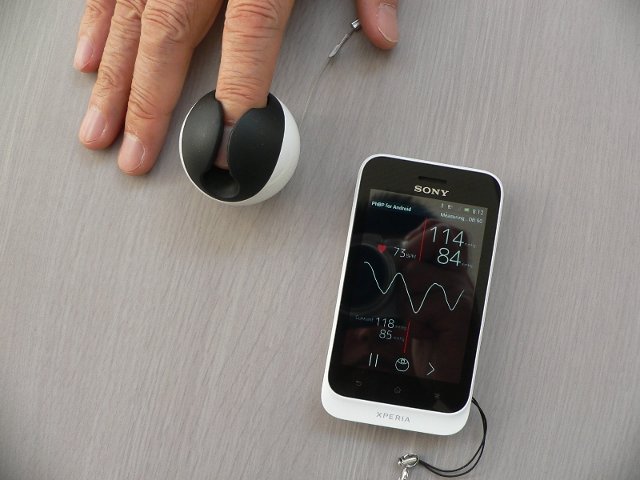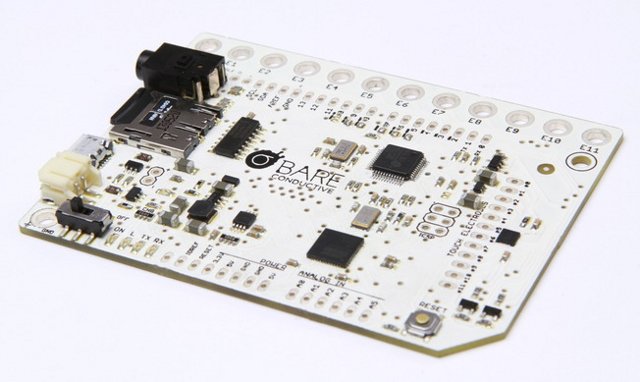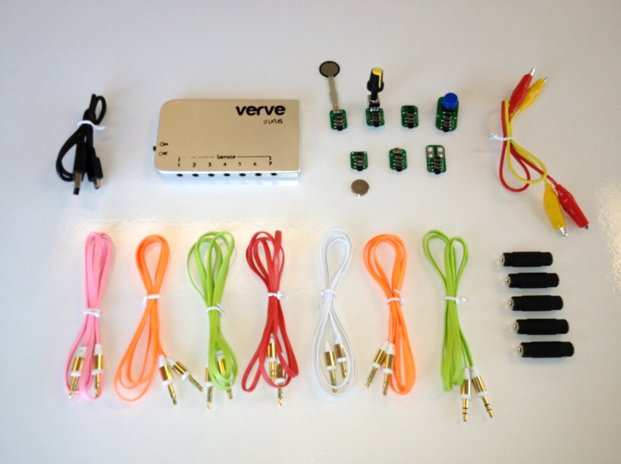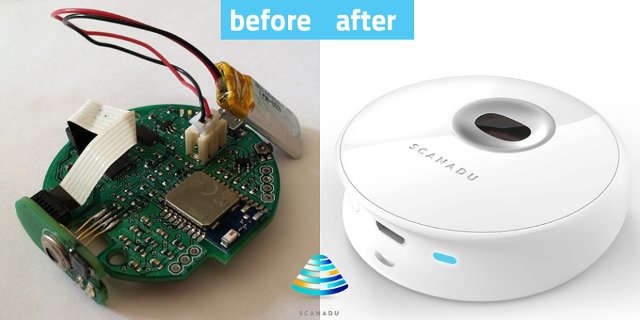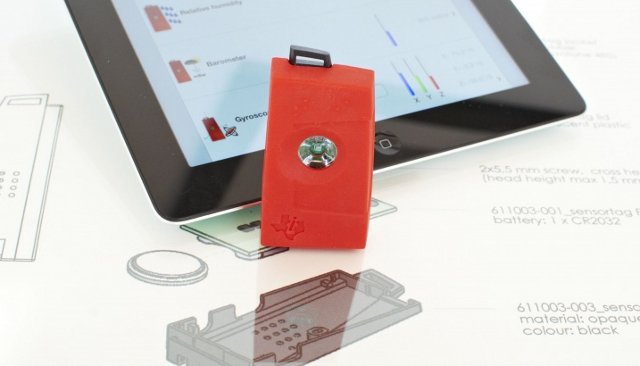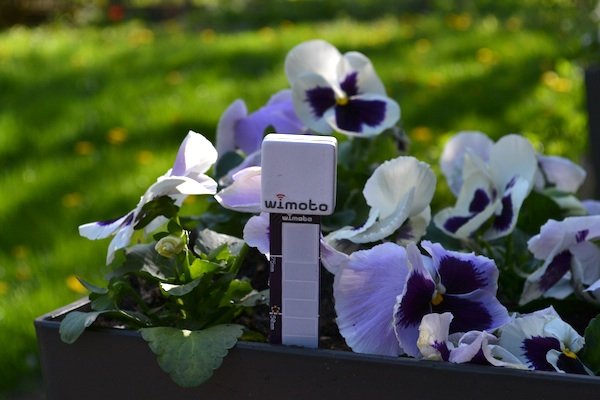Nihon University have developed a tiny blood pressure monitor, which you can just touch with your finger, in order to get maximum and minimum (systolic and diastolic) blood pressures, both average and real-time values, as well as pulse rate and pulse waveform displayed on your smartphone. ICMe uses photo transistors to detect LED light reflected on a finger, and then converts pulse wave data obtained from the light to a blood pressure value. Phase Shift Method-based data processing and algorithm is used for the conversion to a blood pressure value, and results are transmitted to the phone via Bluetooth 4.0 (LE?). The device is composed of a custom main chip, LEDs, photo transistors, and a Bluetooth 4.0 module. Tech-on reports an early much larger model was exhibited last year at Medica 2013, and the new miniaturized model is currently showcased at Medica 2013, which runs from Nov 20 to 23, […]
Almost Anything Can Be A Touch Input with The Touch Board and Electric Paint
Bare Conductive, a British startup, has designed an Arduino Leonardo compatible board with 12 capacitive touch sensors called the Touch Board. You can basically use any conductive material as a touch sensor, but the company’s existing “electric paint” really makes the board come to life, and you can just draw circuit anywhere, be it on paper, your wall, cardboard, and create fun and useful applications. Touch Board specifications: MCU – Atmel ATMega32U4 Microprocessor @ 16 MHz with 32 KB of Flash Memory of which 4 KB is used for bootloader. External storage – MicroSD card slot I/Os: 20 digital I/O pins (3 used for Touch IC and 5 for MP3 IC – can be disabled) 7 PWM channels 12 analog input channels 12 Touch electrodes of which 8 can be configured as extra digital inputs or outputs with PWM capability. (via Freescale MPR121) Audio – Playback and MIDI support via […]
The VERVE Connects Sensors Your Computer for Gaming, Monitoring, and More
The VERVE is a little box that connects to one of the USB port of your Windows or Mac OS X computer (Linux support coming in 2014), and supports up to 7 sensors. It is available as part of a kit for $99 on Kickstarter. The kit includes the VERVE, a mini USB to USB cable, seven “sensors” (A force sensor, a push button, a light sensor, a potentiometer, a motion sensor, a magnet sensor, and a touch sensor), two banana clips for the touch sensor, seven cables to connect the sensors to the VERVE unit, and 5 extension blocks. Once the VERVE unit is connected to your computer, and the needed sensors are connected to the VERVE, you can launch the VERVE application to visualize the sensors data in real-time, and assign a mouse or keyboard action based on the sensor’s data level as shown below. There’s also an […]
Google Announces LG Nexus 5 Smartphone with Android 4.4 KitKat
Google has partnered with LG and Nestle to bring to market the latest Nexus 5 smartphone featuring Android 4.4 “Kitkat”, the latest, and brand new, release of Android. Let’s first have a look at the device, and then we’ll go through the new features and improvement brought by Android 4.4. LG Nexus 5 Nexus 5 has the following technical specifications: SoC – Qualcomm Snapdragon 800 @ 2.26GHz with Adreno 330 GPU @ 450MHz System Memory – 2GB RAM Storage – 16 to 32 GB flash, but no microSD slot Display – 4.95″ touchscreen display with 1920×1080 resolution, Gorilla Glass 3 Connectivity – Dual band 802.11a/b/g/n/ac WiFi (2.4G/5G), Bluetooth 4.0, NFC, and GPS Celullar Networks – 2G/3G/4G LTE. GSM, CDMA, WCDMA, and LTE in North America, and GSM, WCDMA, and LTE for the rest of the world. Camera – 8MP rear camera with Optical Image Stabilization (OIS) and 1.3MP front camera […]
Scanadu Scout Medical Tricorder for Android and iOS
Low cost personal medical tricorders have the potential to dramatically bring down the cost of health care, and avoid unnecessarily wasted time in hospitals, which is probably the XPRIZE Foundation has launched a competition for medical tricorders, where the winners will get 10 millions US dollars in funding. Scanadu Scout is one of the entry, and they currently have an indiegogo campaign, already oversubscribed, for their medical grade tricorder which gather data by placing it on your forehead for 10 seconds, and display medical data transferred via Bluetopoth Low Energy (Bluetooth SMART) on your iOS and smartphone. The company did not disclose full specifications, but they still revealed the device runs 32-bit Micrium RTOS, which is already FDA approved (pre-market 510K notification and PMA approval), it supports Bluetooth 4.0 SMART, and a micro USB port is included to recharge the battery. I fired up few Google image searches to look […]
$25 Texas Instruments SensorTag is a Bluetooth LE Devkit with 6 Sensors
Yesterday, I wrote about Wimoto Motes, tiny Bluetooth LE devices with several sensors that can be controlled and monitored via an iOS app, and soon by an Android app, as well as Linux devices. Each mote costs $39 plus shipping, and one commenter mentioned the price may be a bit too high. A Google search for “bluetooth sensor” immediately brings TI SensorTag, which looks somewhat similar, except it is a Bluetooth LE development kit, includes 6 sensors (but no light sensor), and only costs $25 including shipping. SensorTag Specifications: Bluetooth 4.0 low energy (CC2541) SoC 6 sensors connected via I2C: IR Temperature sensor (TI TMP006) Humidity sensor (Sensirion SHT21) Pressure sensor (Epcos T5400) Accelerometer (Kionix KXTJ9) Gyroscope (InvenSense IMU-3000) Magnetometer (Freescale MAG3110) Power – Single cell coin cell battery (CR2032), quiescent current consumption of 8uA, allowing years of battery life. FCC, IC and ETSI certified solution Dimension – 71.2x36x15.5 mm, […]
Wimoto Motes are Tiny Bluetooth Sensors for iOS, Android, and Linux Devices
Wimoto Motes are small (30x30x8mm) wireless sensors that communicate temperature, humidity, soil moisture… values to your iPhone, iPad, Android, and Linux (yes, including the Raspberry Pi) devices via Bluetooth. They are said to last for about a year on a single CR2032 battery and don’t require an Internet connection to work, but you can still upload your data to Wimoto cloud service via the app, or use an optional mote.cloud bridge to do it for you in realtime via Wifi. There are currently 4 Motes: Climote – Measures light (0 to 60,000 lux), temperature (-25 to 85 C) and humidity. Used to monitor a room environment (bedroom, cellar, greenhouse,…), and tell you if you need to make adjustment Growmote – Measures sunlight (0 to 60,000 lux), soil moisture (5 levels) and temperature (-25 to 85 C), to make sure your lawn or flowers are not thirsty. Thermote – Measures an object temperature […]
Toradex Open Sources Oak USB Sensors & Interface Boards
Toradex Oak product family is a range of USB sensors enabling measurement of humidity, temperature, motion, orientation… and USB expansion boards with relays, digital I/O and more. Following feedback from customers who needed to customize the designs, Toradex decided to fully open source those sensors and interfaces by releasing hardware files and the source code under Creative Commons License ‘Attribution CC BY’. This release brings 13 USB sensors to the open source community: Oak USB Sensor Atmospheric Pressure Oak USB Sensor 3 Axes Acceleration Oak USB Sensor Angular Rotation Oak USB Sensor Humidity Oak USB Sensor IR Distance Triangulation (10-60cm) Oak USB Sensor IR Motion Detection Oak USB Sensor Luminosity (LUX) Oak USB Sensor Orientation (3-Axes Accelerometer & Magnetometer) Oak USB Sensor 3 Axes Tilt/Inclination Oak USB Sensor IR Distance Triangulation (10-80cm) Oak USB Sensor 2 Channels Thermocouple Oak USB Sensor 4 Channels Capacitive Proximity Switch Oak USB Sensor RGB […]


